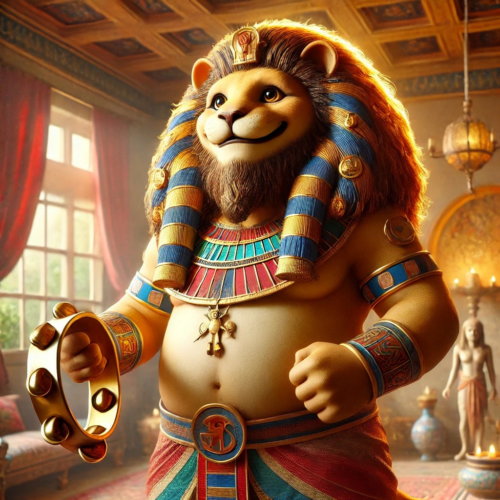Bes, also known as Bisu, is a god from ancient Egyptian mythology who is easily recognized by his unique appearance. He is depicted as a dwarf with a lion’s mane, a large head, and a big grin on his face. Despite his small stature, Bes holds a prominent role as the god of humor, music, dance, and protection.
Protector of Mothers and Children
Bes is best known for his role as a protector of households, especially mothers and children. His playful and mischievous demeanor made him a beloved figure in the daily lives of ancient Egyptians. He was often invoked during childbirth to protect both the mother and baby from harm. Unlike many other deities, Bes was a household god, worshipped in private spaces rather than grand temples. His presence was believed to keep evil spirits at bay and ensure the family’s well-being.
God of Music, Dance, and Joy
Bes brought joy and celebration into homes. In ancient Egyptian art, he is often depicted dancing, playing musical instruments, or making silly faces to entertain and uplift spirits. He is closely associated with tambourines, sistrums, and other musical instruments, many of which he was said to have invented. Festivals and gatherings often invoked Bes’s spirit, turning ordinary moments into joyful celebrations. His exuberant nature is similar to the joy brought by Hathor, the goddess of music and dance.

Guardian Against Evil
Bes’s fierce appearance was also his greatest weapon against evil. Despite his joyful nature, he was a formidable guardian. His lion-like mane and exaggerated features were meant to frighten malevolent spirits. Amulets and household items featuring Bes were commonplace, offering protection to families from the unseen dangers of the world. His protective qualities align him with other deities like Taweret, who guarded childbirth and fertility.
Symbol of Fertility and Healing
Beyond his humor and protection, Bes was also revered for his healing powers. He played an important role in fertility rituals, often invoked to bless couples with children and ensure healthy pregnancies. His image, frequently adorned on beds and mirrors, symbolized abundance and vitality. Bes’s connection to fertility complements the roles of deities like Isis and Hathor, further embedding him in the fabric of domestic life.
Legacy of Bes
Bes’s influence extends beyond ancient Egypt. His jovial and protective image resonates with universal themes of family, joy, and protection. He serves as a reminder of the importance of humor and celebration in overcoming life’s challenges. Today, Bes remains an enduring symbol of joy and guardianship, representing the power of laughter and love to ward off life’s hardships.
Appearances in Modern Culture
Books
- Bes and the Birth of Joy by Laura Tempest Zakroff
- Gods and Myths of Ancient Egypt by Robert A. Armour
Video Games
- Assassin’s Creed: Origins (2017)
- Age of Mythology (2002)
